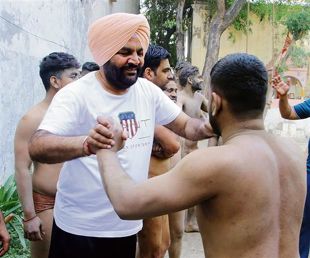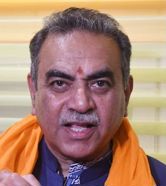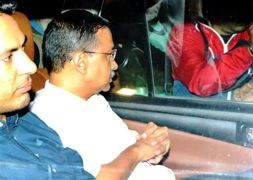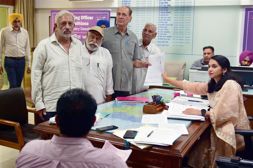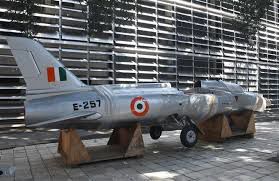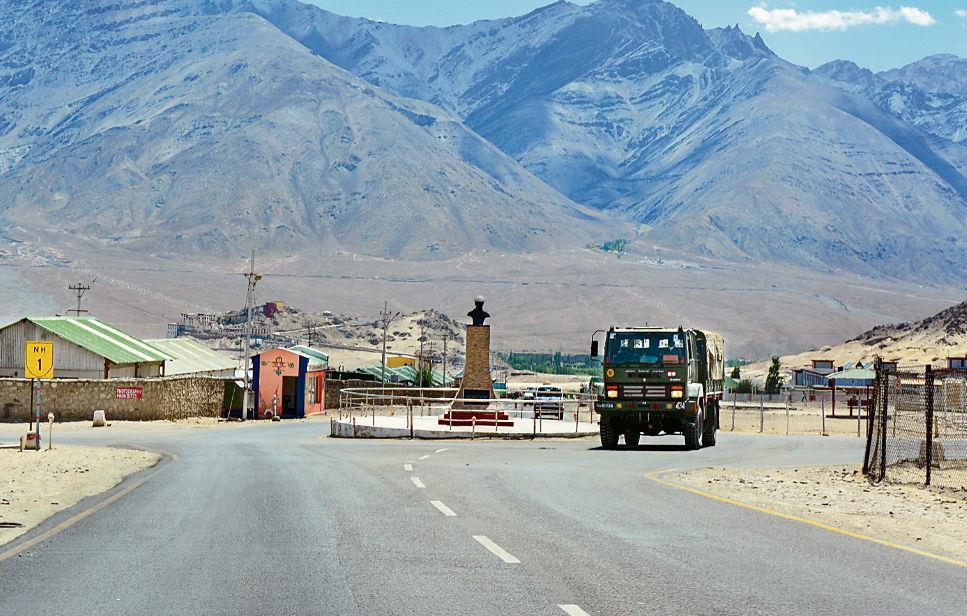
Photo for representational purpose only
Forgotten words of our founding members — time to remember them. Time to give ourselves a democratic government as envisaged in our Constitution in the sense it was supposed to be, and not the aberration it has become. Time to ask ‘what did you do?’ and ‘what will you do?’ for the entire electorate (village, zila, state or nation). Time to name and shame, also to reward. It is a weak people who get the proverbial ‘strong leaders’, a strong people demand results from their elected representatives; they are not dominated or overawed by the PR campaigns of larger-than-life personas. They are not waylaid by the divisive and misleading agendas of organisations driven by greed and malice. In our system of democracy, we are supposed to vote for the best candidate in the constituency for the job (be it MLA, MP or a sarpanch) at hand. This task should not be dominated by a distant dynasty or powerful leaders who are projected to be omnipotent — there are no supreme beings fighting elections, only humans, and they are mostly fragile creatures fraught with flaws, self-doubt, and insecurity. We need to elect the local candidate in whom we the people see good leadership, vision, and a keen sense of compassion and humanity.
I have never fully read the manifestos of various political parties issued before any important election for the simple reason that they are so lengthy, boring, repetitive and experience has shown us that the assurances are seldom carried out. One has also noticed that a vast majority of voters does not really focus on the important issues, but votes on the basis of caste, religion, region and other allurements that are offered on the eve of election. The voter does not also fully understand what he himself expects from the government. This is the result of a failure of the various pillars of democracy, namely the media, the judiciary and in the case of elections, the political parties and the Election Commission. Candidates with criminal backgrounds who should have been barred not only contest, but win; they are highly sought after for their money and muscle power — the two key elements assuring winnability. It is the nexus of criminals, political elements, smugglers, police and the entire criminal justice system which allows for these individuals to intimidate, coerce and bribe a vast majority of the electorate. These individuals also are masters at spreading deceit and falsehoods to sway people on the basis of caste and religion. You will invariably find incidents of communal and casteist nature happening in the shadow of elections. The common people invariably fall for these narratives, because the counter-narrative which should be led by the media and political and social groups is weak and in most cases non-existent. The cynicism in society at large towards politicians and politics has reached a level of total disillusionment. Even subsequent to the elections, Parliament — that edifice of democracy — is gradually being converted into a farce where Bills are passed summarily without debate through ‘voice vote’. Parliament is the institution through which new laws are debated and enacted, new policies are initiated and budgets are passed. All other issues of national importance are brought up and discussed. The deliberate and encouraged reduction of this democratic institution into one representative of bedlam and chaos in the shadow of which brute power is exercised and laws with vested interests in mind are passed is deplorable. Is this situation in Parliament the prologue of what is to come or is it the epilogue of what has happened? Time will tell.
Every party, national or regional, promises “good governance” or “less government and more governance”. When was the last time we saw a period of ‘good governance at the ground level’? At the level where people interact with the face of the government — Police, Revenue, Development, Health, Education, etc. The foundation of good governance begins in the ability of various levels of government starting with the Chief Ministers, Ministers, officers and downwards keeping directly in touch and involved at the ground level with the people, their constituency and the progress of works. One of the methods this can be done is through extensive touring. Seeing things gives you a deeper perspective and fast forwards your work. These days, officers do not go on tours, and ministers only go for inaugurations, marriages and ‘bhogs’.
Another essential ingredient in good governance is postings and transfers of officers. The system is totally manipulated, a fair and judicious system just does not exist with the result that corrupt, useless officers get key appointments. For senior postings in the states, e.g., DCs and SPs, if the right officers are chosen, things improve immediately. Similarly, at the Centre, coveted posts like the heads of CBI, NIA, CAG, secretaries to important ministries, ED, Customs and Excise, Income Tax, etc, are increasingly becoming politicised. There are well laid out procedures for their postings and that of their junior officers. However, the systems are constantly bypassed, and the judiciary is a spectator in most cases. These agencies are thereby reduced to becoming tools to harass opponents and make them fall in line.
Accountability of the elected representatives based on the promises they made and the delivery thereof should be the fundamental criteria on which to judge the performance of an incumbent. Transparency is another huge factor in government work. It is of utmost importance. Why should the people be not informed of national events, ranging from the Ladakh situation to the pandemic and before that demonetisation and migration? Why should we not be informed of the state of the economy and correct unemployment figures? We see pictures of bodies floating on the Ganges and buried on its banks, but the state denies it. The Centre gives a figure for the total number of deaths, but reputed international agencies say the correct figure is 10 times the official figure. The Pegasus scandal breaks out and some targeted names are revealed but not a word from the government on the subject. Thousands of farmers on the roads in winter and summer, hundreds of them dead — nobody even visits them! The list is endless, both at the Centre and the states. Is RTI still there?
What we want is transparency on important issues, no matter which party comes into power. Governments should not be in ‘purdah’ and every question should not be labelled as seditious.
An improvement in the quality of life is what every citizen seeks. The American Constitution enshrines the right of every citizen to seek the ‘pursuit of happiness’. Our forefathers enshrined it similarly in our Constitution when they spoke of ‘equality of status and opportunity’. The right to gainful employment is very much part of this promise. People are not interested in statistics. What they do not want to see is thousands of youngsters loitering about, hungry babies and famished mothers. We do not want our youth to take to drugs and crime. Hundreds and thousands of them are migrating to the West and the Emirates where they are not given treatment equal to their own citizens. Why cannot political parties draw up a massive plan which gives us both development and employment? There are various successful models which have been implemented throughout the world in recent history from which we can learn. We have some of the best minds in economics and allied fields, we have leading captains of industry and tremendous depth in our agricultural knowhow. Why cannot our leaders harness these resources to conceive and deliver a concrete five-year programme which is not a fairy tale but a step-by-step methodological plan for growth and development? Let us build a network of schools and hospitals — remember that the road to development passes through good education and health of our children and youth. Infrastructure to catapult India into a modern economy in sync with the developed world, and catering to growing environmental concerns and the challenging nature of adapting to climate change. We are in the digital age and in a time of tremendous disruption where the world has to live with the transition from the fossil fuel economy to a sustainable future, let us not miss it.
— The writer is ex-chairman of UPSC, former Manipur Governor and served as J&K DGP
Join Whatsapp Channel of The Tribune for latest updates.






















